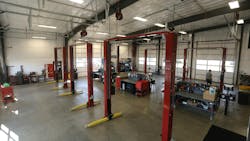Shawn Gilfillan and Rob Heerspink are two shop owners that are miles apart in one way and practically side by side in another.
Gilfillan is founder and owner of Automotive Magic/Magic Lube and Rubber, which has a repair component resting in Kenvil, Roxbury Township, New Jersey, with a Lake Hopatcong lube business less than five miles down the road.
Meanwhile, a 43-hour drive across the country in Lynden, Washington, Heerspink owns and operates Lynden Lube, a shop that offers repair alongside a more recent quick lube component, all in one location.
Although far apart in physical distance, the two men are nearly of one mind about what it takes to successfully run businesses that combine automotive repair and quick maintenance functions.
Here are four key observations the owners shared that may help other owners who are thinking about giving it a try.
No. 1 Dual Business Observation: Service Your Specific Local Needs
According to both owners, the decision to offer repair and quick lube came about in response to a need within their geographic areas.
For Heerspink, he says Lynden Lube rests in a rural, agricultural community where there were no quick lubes to be found. And as a result, the notion of quick lube was misunderstood and viewed as being less detailed than the service an auto repair shop could deliver.
“So, we had to build up trust because at first the concept of quick lube was foreign to our community,” Heerspink says. “People did not embrace it right away.”
Today, Lynden Lube has six repair bays and three for quick lube, and the individual services of each are appreciated by the community.
Similarly, Gilfillan’s experience setting up his combination repair-quick lube services came about organically, as well.
“We kept bumping up against situations where we were pulling techs off bigger jobs to service quick oil changes on vehicles,” the Automotive Magic/Magic Lube and Rubber owner says.
So, as an organization, Gilfillan notes, he and his workers had to look at how to serve both needs. Fortunately, there was a maintenance shop just up the street where an elderly owner was looking to get out of the business, so Gilfillan and team purchased the business’s space and opened their three-bay lube and tire service.
“We didn’t want to lose the service and have a brake job, for instance, ending up at somebody else’s door,” he notes.
No. 2 Dual Business Observation: Sort Out Your Unique Staffing Requirements
For Heerspink at Lynden Lube, he has kept his experts in the repair side doing what they do best. And then he has worked in the quick lube side of the business to help build up his workers there.
“It’s important to keep people in key positions,” he notes. “Obviously a general manager, Chad here at my business, helps in terms of leadership. But it’s so important to have long-term employees who contribute to the consistency of services we provide.”
On both sides of his business—quick lube and repair—Heerspink says he feels fortunate for the long-term employees who’ve built strong relationships with the community and who are regular, personable faces representing the business.
He notes, too, that there are unique business advantages to having staff that can piggyback off one another.
“Customers love having both businesses together,” as he puts it. “If a lube tech catches something that’s not right on their vehicle, customers have immediate access to six certified mechanics who can do some things right away or schedule them for later if it’s not a big deal.”
Heerspink adds, “There’s a comfort in having these completely different skill sets in our people and then seeing how they complement each other as a team.”
Gilfillan reports that he, too, keeps his workers on both sides of the business serving to their strengths.
He notes, “At the repair shop, Automotive Magic, I have two high-level diagnostic technicians, and if you bring it here, it’s going out fixed.”
Then, in his local county he sits on a board for a local apprenticeship program, which is a source for funneling new workers into the business wherever needed.
“We train everybody in the business on how the business works,” Gilfillan adds of his workers, regardless of which side of the business they work in. “And we have profit sharing too, so the better the business does, the better we all do.”
A family feel and environment is something else Gilfillan says he has cultivated in his businesses, which serves to bind the two nearby locations as one.
“We’ve created a family for everybody who works in this organization—and it’s special because we are glued together and living into our core values, and we have each other’s backs,” he describes.
Gilfillan has enjoyed creating the family environment of his stops so much that he and his uncle have partnered together to build a 20-week program around culture-building.
As part of it, they are coaching others in the auto repair and quick lube industries, touching on topics like assertive listening and tools like DiSC personality analysis, which looks at the personality types of dominance, influence, steadiness, and conscientiousness.
No. 3 Dual Business Observation: Market in Ways That Make Sense for Your Business
Both Heerspink and Gilfillan choose to market their dual business offerings jointly to their local communities.
“Our combined marketing efforts are predominantly local news and a bit of social media,” Heerspink shares. “We also support local community events, and we help sponsor and staff a car show each summer at a local festival.”
Gilfillan says he uses his wife’s expertise in marketing to help promote his business’s offerings.
“She works in marketing at a big pharmaceutical company, and she helps me out on the side,” he describes.
From there, he has people write a blog for Automotive Magic/Magic Lube and Rubber, as well as produce videos he uses on his website.
No. 4 Dual Business Observation: Keep It All in Perspective
Both shop owners’ last words of wisdom about owning and operating a combo quick lube-repair shop? Always remain in learning mode and, most of all, enjoy the ride.
“Pay attention to what’s going on around you and learn from your experience,” as Gilfillan puts it. “You don’t know what you don’t know until you know it.”
Heerspink adds that the quick lube/repair shop model of the future is ever evolving.
“Look at quick lube from 30 years ago to today, and cars are so much more complex,” he says. “So keep up with training. But in the end, it all comes back to having the key people to run a business well.”
About the Author

Carol Badaracco Padgett
Carol Badaracco Padgett is an Atlanta-based writer and NOLN freelance contributor who covers the automotive industry, film and television, architectural design, and other topics for media outlets nationwide. A FOLIO: Eddie Award-winning editor, writer, and copywriter, she is a graduate of the University of Missouri School of Journalism and holds a Master of Arts in communication from Mizzou’s College of Arts & Science.
